#surviving living in macau airport
Explore tagged Tumblr posts
Text
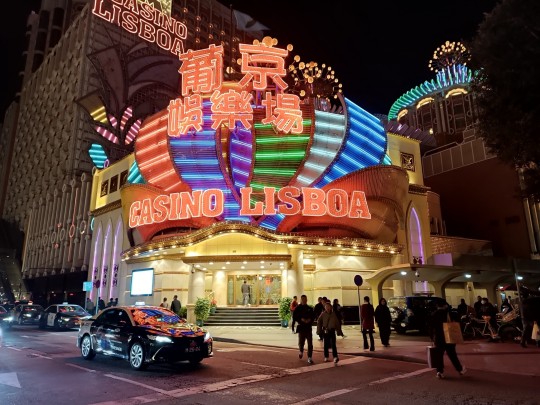
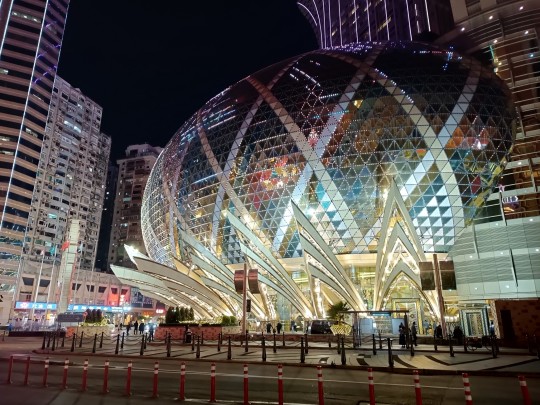
I'm only in Macau for one night, and to be honest it's not popular for visa runs because there's no budget accommodation. I came here for the day when I was living in China in 2017, and went back in the early evening for this very reason. As such, I had never seen Macau properly in the dark (the quest for McDonald's with the Taiwanese kid at 3 am in October doesn't count), and was very curious. Man, it is shiny.
I took the public bus from the airport because the fare was 6 MOP and I had exactly 6 HKD in coinage lurking in my closet from previous voyages (they're interchangeable in Macau). My fellow bus-riders did not appear to be tourists. I took the risk of trusting google maps regarding the bus route, and only felt betrayed for a moment before I realised it was making a detour because of construction, and still headed in the general correct direction, even if it took a bridge that didn't seem to exist on the map yet. Spellbound by the glittering lights and the thrill of being somewhere new, I was finally enjoying myself (having been anxious for days previous already).
Between my hotel and the bus stop was more neon signage than you could shake a stick at, I was enthralled. Check in went smoothly, and I hastened back out to walk around and take pictures. The old city side of Macau was quite hopping considering it was nearly 10 pm on a Tuesday night and cold out, Taipei feels a bit sleepy in comparison (or maybe I'm not going to the right places). I had very sensibly looked up a bunch of restaurants in advance in an attempt to divert for once my usual fate of walking around forever and not eating (although I had brought a lot of bananas with me to the airport after realising they weren't going to survive a week at home, so at least I wasn't running totally on empty). As usual, even the best laid plans can go awry when there are too many things to look at (by things I mean giant crabs in the window of the seafood restaurant). Somewhere around 22:30 I realised I needed to consume something before bed.
The go-to late-night food in Macau appears to be...beef offal. Now, I'm not opposed to offal, I like some grilled intestines at the izakaya, but this was a boiled affair and there were an intimidating amount of bits on display at the kiosks. Afraid I was running out of options before reaching my hotel again, I stopped at a takeaway stand that had a picture of a 煎餅 (fried pancake wrap thing) and inquired with the guy as to whether it could be obtained. (All the signage and menu was in Chinese, so I had started with Mandarin from the get-go.) There was no 煎餅 to be had. I could, however, have a box of rice accompanied by...[here we had many of those silver trays in a bain-marie, filled with various soupy things]. I asked him what one was. He told me "Lú lòu". I was baffled and told him I didn't understand. He said it again as if I'd misheard him. No, I really don't know what that is, I insisted. He said it again more loudly as if I were daft. Finally I remembered that [n] often becomes [l] for Cantonese speakers and he was saying niú roù 牛肉...beef 😑 Well then. I asked if he had any vegetables, which appeared to be an offensive request, so I resigned myself to 50 HKD of rice and meat chunks. Shortly after I discovered if I'd just kept walking, there were plenty of other options, but either way, I had dinner. When life gives you meat chunks...you start chewing.
Tomorrow my return flight is not til 4, which means I should mosey to the airport a bit prior to 2, so if I go to bed within the next 15 minutes I might make it for breakfast and some more trotting around looking at things (an activity that was cut short in 2017 on account of it being mid-summer and the heat rendering me somewhat delirious). These days going places often feels like a heinous exertion while in the planning stages, but once I'm out there I start getting into the spirit of it. Enrichment. Outside of my enclosure, even!
#on the airport train to taoyuan i was ruminating on how disenchanted i am with said airport train to taoyuan#but guess what this time i am flying into kaohsiung#and then going on a little train trip#my christmas present to myself i suppose#before i need to really work on the stressful thing I've decided to do at the last minute
27 notes
·
View notes
Text
KIM JONG-NAM
KIM JONG-NAM
10 May 1971 - 13 February 2017
Kim Jong-Nam was the son of North Korean leader Kim Jong Il and half-brother of Kim Jong Un. Jong-Nam was heir from 1994-2001.
In 2001, he was arrested in Japan with a fake passport in an attempt to visit Tokyo Disneyland. He was with two women and his son, aged 4. After being detained he was deported to China. Jong-nam lost favour with his father, Jong-nam stated it was because he advocated for reform and his father believed he had turned into a ‘capitalist’.
Jong-nam was exiled from North Korea in 2003 and became a critic of his family’s regime. His younger half-brother Kim Jong Un, was named heir in 2010. Jong Un had ties to China and remained a possible candidate to replace Jong Un.
In 2011 after his father died, Kim Jong Un became leader. Jong-nam stated that he expected his brother to fail due to his inexperience and youth. He stated that ‘without reforms, North Korea will collapse… and then the regime will collapse’. Jong-nam survived an assassination attempt in 2006 as well as in 2012. He had lived incognito in Macau with his family.
Jong-nam who usually travels alone was assassinated at the Malaysian Airport in 2017 with nerve agent VX by two young women, most likely on his brother’s orders. A woman in white ran up to him and covered his mouth with a wet cloth; he started feeling dizzy and informed airport officials who took him to the medic. He was then slumped on a chair, and was taken to the hospital where he died.
Four suspects left the airport and traveled back to Pyongyang. The two women, who directly murdered him, stated they were set up, after being told it was for a TV prank.
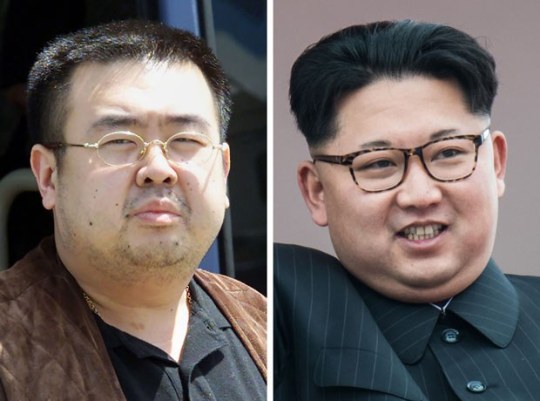
#kimjongnam #kimjongun #northkorea
0 notes
Text

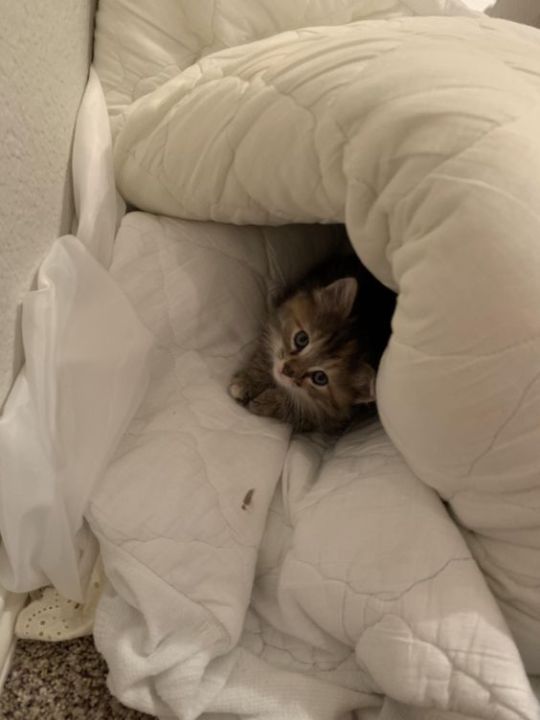
Throwing out a ficlet because guess who had another 14 hour day and is having trouble de-compressing 🙃 This is self-indulgent AF because honestly what I wouldn't give to just be locked in a hotel room without any work to do. You can see my sanity leave as the ficlet goes on.
Summary:
Aiden and Lambert are stuck in hotel quarantine in Macau, China.
Tags:
modern au, asian!Aiden (because @jlyarts and I say so), crack, covid, hotel quarantine, mentions of gambling, tons of gratuitous nonsense
_________________
He was a second away from drifting off when the bathroom door swung open and bursts of steam twirled into their hotel room.
"Lamb."
"What?"
"Lamb I'm bored."
"Aiden-" Lambert sighed and sat up, not bothering to hide his disdain, "We've been here for 2 hours. We have 13 days and 22 hours more to go."
"But I'm bored."
Lambert sighed and attempted to throw a pillow at his cat. Aiden batted it right back at him, because of course his focus was still razor sharp. They'd just survived 13 hours of flying and a 10 hour layover, and while Lambert felt a used tissue on the floor of Gatwick airport, Aiden was as fresh as the pomegranate salad he'd had on the plane over.
They were put up at a fancy hotel and while that normally would have been a blessing, being barricaded in a room just within reach of the slot machines and the baccarat tables was about torture for him. And Aiden probably felt the same, because he was pacing topless along the length of their comparably tiny room, dripping water across the carpeted floor and practically vibrating with energy.
"Kitten. Put on some clothes and come to sleep. It's 10pm."
"I'm jetlagged."
He huffed another sigh, and his sleep-addled brain presented only one option: wrestle Aiden to bed. To his credit, the cat put up quite the fight but he failed to anticipate Lambert rolling him up in the blanket like a burrito, and then falling dead asleep on top of him. Eventually he fell asleep from boredom.
Day Three
Aiden's parents were a blessing. They'd sent a box of portuguese egg tarts, pineapple buns and pork chop buns. Lambert watched in awe as Aiden devoured everything in one sitting, and he was left to wonder how one tiny body fit all that food.
His cat was shorter than him by a good few centimeters and scrawnier, and yet he was somehow capable of demolishing a loaf of bread without blinking an eye, while Lambert gained a kilo by simply walking by a bakery and sniffing gluten once.
Day Five
Lambert thought himself a genius. He'd put Aiden's kneading fixation to good use by convincing him that they should make use of their time to pick up a massage skill or two.
The WiFi was crap but they'd manage to discern the instructions from a 240p video, and at the end of it, he fell asleep after a one hour massage.
Day Six
Aiden finished reading all the books they brought, and Lambert woke up from a dream where he ate a hamburger. He was on the verge of tears when he woke up, because he missed burgers more than he missed his gaming setup.
Day Seven
His in-laws sent over hotpot and beer. Life felt like it was worth living again.
Day Ten
They attempted yoga on the balcony in a bout of madness. Aiden was fluid, flexible, and flawless, stumbling only once when Lambert fell on him mid-way through a pose.
Day Twelve
Lambert had a 3 hour call with Geralt, Eskel, Ciri, and even Vesemir because he felt his sanity cracking. The connection was as bad as Vesemir's receding hairline, but he counted his blessings.
Day Fourteen
"Someone's coming," Lambert announced, for just about as excited as Aiden. He was standing behind the door with his ear plastered to the frame, suitcases in hand and ready to bolt. He straightened up when the footsteps drew closer, doing his best to look sane for whoever would open the door. His cat just sniggered stepped into his space, wrapping his arms around his middle and sighing contentedly into the crook of his neck.
"You know," he heard the gentle rumble and felt the rub of a cheek against his shoulder, "I'm glad you're here with me."
And Lambert pecked a kiss on the crown of his head and said nothing, because as much as he would never admit it, he didn't actually hate being stuck in a room for two weeks with the love of his life.
29 notes
·
View notes
Text
Hello World!
Udah tidur di Airport, nyasar pula. menurut ilmu sotoy gue, pasti itu kan yang mau kalian omongin ke gue?! HEHE
Macau Map. Source: http://www.worldatlas.com
Seperti yang udah pernah gue omongin sebelumnya, meskipun negara ini dengan Kota Jakarta masih gedean kota Jakarta, tapi Macau punya banyak tempat wisata yang harus dikunjungi. So, Mari kita jelajahi Macau!
Pusat wisata kota Macau terletak di San Marlo, di wilayah ini terdapat komplek Senado Square(Largo do Senado) yang berisi bangunan bergaya arsitektur khas Tiongkok dan Portugis. Di sini pula terdapat Ruin of St.Paul yang sudah menjadi iconic negara ini. Negara yang terkenal sebagai Las Vegas-nya Asia ini merupakan negara yang melegalkan judi dan Casino-casino pun tumbuh berkembang dan bahkan menjadikannya sebagian besar pemasukan negara. Diantara banyaknya Casino yang megah berdiri, setidaknya terdapat 3 Casino terbaik seantero Macau, yaitu; Wynn Hotel, Grand Lisboa, dan juga Venetian Macau. Bahkan di hampir setiap hotel besar disana menyediakan banyak tempat wisata, dari yang gratis hingga yang berbayar. Menurut gue, pinter banget deh mereka narik wisatawan untuk berkunjung ke hotel-hotel mevvahnya, meskipun gak untuk menginap.
Lets cekidot!
Day – 2 Venetian, Senado Square, Ruin’s St. Paul, Wynn Hotel
Pada dasarnya semua aktifitas yang kita mulai saat itu selalu dari jam 10 waktu Macau, karena free shuttle bus baru ada itu dari jam 10. Kita selalu ke Venetian terlebih dahulu karena kita ingin menitipkan koper kita. Habis dari Venetian kita lanjut ke Senado Square dan Ruin’s St. Paul yang kebetulan Ruins St. Paul itu berada di sekitar Senado Square naik free shuttle bus yang ke Grand Lisboa. iya anaknya emang maunya gratisan mulu.
Egg Tart
Didepan Senado Square ada yang jual Egg Tart, kalau di Indonesia namanya Portugis Tart, ini enak banget rasanya rasa telur terus agak manis-manis gitu. Rasanya beda dengan yang dijual di Indonesia, gatau kenapa ya menurut gue aslinya bener-bener enak. Sayangnya Egg Tart ini expirednya cepet, hanya kisaran 5hari doang awetnya, hampir sama dengan Tokyo Banana. Padahal waktu itu pengen banget bawa pulang, biar orang-orang rumah tau enaknya Egg Tart tuh kayak apa😅
Grand Lisboa
Senado Square ini hampir sama kayak Paris Van Java di Bandung, tapi disini lebih seperti komplek bukan Mall, daerah ini banyak gereja bergaya klasik, toko-toko, sangat crowded, karena bukan cuma tourist, tapi warga lokal juga memenuhi area ini. Bangunan di sekitarnya hampir rata-rata berwarna pastel bergaya mediterania. Diantaranya yang berdekatan adalah Leal Senado Building, General Post Office dan Macau Tourism Centre.
Makin siang makin padat, habis foto-foto dan liat-liat sekitar Senado Square kita langsung nyari jalan untuk menuju ke Ruins St. Paul, dari Senado ada petunjuknya kok untuk ke Ruins St. Paul itu, tidak begitu jauh, menurut gue ya, karena gue tukang jalan dan ya asal di nikmatin aja hehe
St. Dominics Cruch, Macau. Source: Wikipedia.org
Saat perjalanan menuju Ruins St. Paul, di kiri jalan kami menemukan satu gereja unik bercat kuning yang sangat khas bergaya Portugis bernama St. Dominic’s Church. Gereja tua yang sangat terkenal ini juga merupakan bagian dari Macau World Heritage yang dibangun pada tahun 1587. Gereja ini mengingatkan gue pada satu latar cerita film Little Missy yang legendaris itu.
Ruin’s St. Paul
Sebuah sisa reruntuhan gereja peninggalan Portugis abad ke-16 M yang kini hanya tersisa tembok bagian depannya saja. Banyak tourist yang naik ke atas reruntuhan ini melalui tangga di bagian belakang reruntuhan itu hanya untuk melemparkan koin ke jendela yang dengar-dengar sih bisa membuat keberuntungan. Selain Ruin of St.Paul, masih ada lima belas gereja dan kapel bersejarah lainnya sisa peninggalan abad 16-19 M yang tersebar dibeberapa wilayah kota maupun di perbukitan.
Grand Lisboa dari jauh (Sorry ya agak shaking)
Nah, pas udah selesai penasarannya dengan Ruin of St. Paul kita semua langsung bergegas ke Wynn Hotel, jalan kaki aja! anaknya gak manja banget emang HAHAHA. Luxury Hotel di Macau itu jaraknya gak jauh-jauh amat sebenernya, saat perjalanan dari Senado Square ke Wynn Hotel itu kita ngelewatin Grand Lisboa Hotel yang termasuk dalam salah satu Luxury Hotelnya Macau.
Casino Grand Lisboa
ada Demo di depan/samping Grand Lisboa Casino
pas kita didepan Grand lisboa kita agak bingung ada rame-rame apaan, pas kita deketin ternyata mereka demo, dan banyak polisi juga yang pasti, jelasss demo masa iya gak ada polisi hehe. tapi gue gak tau sih apa yang mereka demo-in, ngomongnya pake bahasa canton, tulisannya apalagi kan makin gak gue ngerti HEHE. yaudah bodo amat ya mereka demo-in apa, yang pasti bukan demo gara-gara ada bom sarinah di Jakarta ya (karena kebetulan pas hari itu lagi ada Bom di Sarinah), yaudah terus kita lanjutkan perjalanan kita ke Wynn Hotel.
Masih di depan Grand Lisboa menuju ke Wynn Hotel
Perjalanan menuju Wynn Hotel
Wynn Hotel dari depan Grand Lisboa
kita ke Wynn Hotel bertujuan untuk melihat yoi baku banget ngomongnya WKWK ngeliat air mancur yang katanya spektakuler.
Air Mancur Wynn Hotel
Foto ini gue ambil pas saat baru – baru mulai air mancurnya muncul, jadi masih kecil-kecil gitu airnya, tapi ya gue akuin sih bagus banget settingan air mancur menari yang digabungkan dengan cahaya dan music yang membuat tarian dari air mancur tersebut jadi makin cantik untuk dilihat, tapi tetep bagusan Liga Tari kalo nari HAHA promosi dikit. ok lanjut! Hampir sama dengan kalau kalian pernah ke Spore di Sentosa Island itu ada Wings of Time, yang perpaduan dari elemen air, animasi dan juga cahaya yang membedakan adalah kalau WoT ini lebih ke sebuah cerita atau animasi sih.
Air Mancur ini ada setiap harinya mulai dari jam 6 sore sampai jam 1an tapi gak selama 7jam non stop ya, durasinya kalo gak salah sih per setengah jam gitu, untuk melihat air mancur ini terletak di front of Wynn Hotel yang bisa di lihat dari depan ataupun dari dalam Restaurant dalam Wynn Hotel tersebut. Ohiya, Air Mancur ini Free ya guys!
Front of Wynn Hotel’s Casino
kita nonton air mancur itu sampai habis, nggak bukan sampai jam 1 pagi, tapi sehabisnya season yang jam 6 itu hehe. abis selesai terus kita lihat-lihat di dalam Wynn hotel deh, lihat Casinonya juga, gak masuk sih cuma di depannya doang.
abis itu udah merasa gabut di Wynn Hotel akhirnya kita memutuskan untuk kembali ke Venetian Hotel, hari terakhir kita nginep lah di Venetian! YA NGGAK LAH GILA, DUIT DARI MANE! HAHA bercanda guys, kita ke Venetian cuma mau jalan-jalan, ke Venetian udah pasti kita naik Free Shuttle Bus dari Wynn Hotel, HEHE irit transport banget gak sih kemana-mana naik free shuttle bus.
Ok, sesampainya kita di Venetian kita langsung jalan kaki ke City of Dream, huhu agak dodolnya kenapa kita gak turun di City of Dream langsung ya? hmm tapi kalogaslah sih karena dari Wynn Hotel adanya yang ke Venetian, tapi jalannya gak jauh-jauh amat, karena dari Venetian tuh ada terowongan yang menghubungkan kita ke sebrang, gak sebrang banget sih tapi, ya setidaknya kita bisa sampe ke depan City of Dream gitu, tapi berasanya agak lama pas jalan, efek udah cape sih kayaknya EHEHE.
Vquarium – Source: https://goo.gl/images/xA8jCi
kita ke City of Dream bertujuan untuk ngeliat Putri Duyung Menari-nari, tapi tetep ya bagusan Liga Tari WAKAK apasi gue_- tapi sedihnya, Putri Duyungnya udah bobo beb, tapi boong, pas kita tanya ke petugas letaknya dimana si Putri Duyung? tapi katanya kalau pas jam kita kesana itu udah gak ada, ehehe entahlah. Tapi, sesungguhnya itu bukan Putri Duyung sungguhan, melainkan kecanggihan teknologi yang bisa menyerupai Putri Duyung seperti aslinya, jadi tuh di Lobby utama lah letak dari Putri Duyung tersebut yang menyerupai aquarium yang disebut Vquarium dan berisi ikan-ikan berenang dan juga Putri Duyung kadang ada satu atau dua Putri Duyung yang keluar. Kok gue tau? iyalah, soalnya di lobby yang gue datengin tuh meskipun gak ada si Putri Duyung tapi masih ada tampilan si Vquarium tersebut hehe. City of Dream ini termasuk dalam hotel yang lumayan banyak attactionnya, mulai dari si Vquarium, ada juga House of Dancing, semacam pertunjukan air dan menari gitu.
udah cape terus kita go back ke Venetian ambil koper dan kembali lah kita ke apartment kita di Macau International Airport HAHA.
Day – 3 Macau Giant Panda Pavilion, Macau Ferry Terminal
Ok ini adalah hari terakhir kita di Macau huhu
Bus di Macau, kecil kan?
Hari ter-akhir kita di Macau, saat pagi hari kita bertekad untuk ke Macau Giant Panda yang katanya buka jam 10, nah ke Macau Giant Panda itu kita gak bisa naik shuttle bus, kita hanya naik free shuttle bus ke Venetian itu juga karna harus nitip koper(as always), dan dari Venetian kita naik Bus, lupa Bus nomor berapa tapi yang pasti kan sebelum kita berangkat kita udah cari tau ke Macau Giant Panda itu harus turun di Halte apa, yaudah tuh di halte ada kok petunjuknya Bus Nomor sekian lewat mana aja, dan untuk menuju ke Macau Giant Panda ini turun di halte Seac Pai Van Park, Bus umumnya disana kecil-kecil, kayak Transjakarta yang kecil gitu kurang lebih ukurannya.
Udah nyaman dapet tempat duduk, ternyata salah naik bus :’)
Udah seneng ya “Waahhh kita mau liat Panda!!!”, maklum di Indonesia waktu itu belum ada panda, dan pengen liat Panda tuh beneran lucu gak? udah nyantai, nyantai banget kita ber-sembilan, udah mana supirnya bawa Busnya ngebut bat yaAllah… terus kita semua pada liat-liatan, dalem hati gue “kok ini nyebrang ke bagian Peninsula? harusnya kan kita ke Coloane”, temen gue liat ke peta dan lalu kita memutuskan untuk turun di halte selanjutnya, dan kita turun entah di halte apa gue lupa, yang pasti di daerah pedalamannya Macau Peninsula. kita nanya-nanya orang sekitar TAPI WTF gak ada yang mau nanggepin omongan kita!! karena mereka can not speak english. yaudah daripada pusing jadi kita jajan dulu di sevel, pas banget di depan halte itu ada sevel, abis itu kita nanya lagi, nanya anak muda yang kemungkinan bisa bahasa inggris, lalu kita di arahin untuk muter balik, dan naik ke bus yang ke arah Taipa dulu, yang penting nyebrang, tapi kita nyari yang udah deket-deket ke Macau Giant Panda.
Bus nya penuh banget waktu itu yang ke arah Coloane, jadi kita kayak harus nunggu beberapa bus dulu baru bisa masuk, karena bus yang kecil dan di jam makan siang juga waktu itu jadi lumayan padat apalagi kita ber-sembilan waktu itu.
Nunggu Bus yang tak kunjung tiba untuk menuju Macau Giant Panda
Yaudah, intinya kita naik bus untuk yang bisa nyebrang lagi ke daerah Taipa, terus kita transit di suatu halte dan….. Waktu itu lama banget sih nunggu busnya, di halte gak ada free wifi kan, tempat duduk sedikit jadi kita nunggu dan berdiri haha. Intinya kalau nyasar jangan panik apalagi selama kita bawa Peta.
Finally setelah nyasar 4jam akhirnya nyampe juga di Macau Giant Panda, tapi kelewatan ciyn jadi jalan kaki sedikit
Mendaki jalan untuk ke Macau Giant Panda
FINALLY ARRIVED! @ front of Macau Giant Panda Pavillion
udah se exited itu kan ya, udah muter-muter Macau karna nyasar, nunggu bus sampe pegel, kita sedikit berharap lebih dong pas nyampe di Macau Giant Panda, pikiran kita tuh akan kayak Taman Safari tapi isinya panda doang gitu…
sesampainya kita di Macau Giant Panda, jalan dari pintu masuk ke kandang pandanya lumayan jauh. di depan ada tempat Souvenir store gitu, lucu-lucu, harganya ya lumayan mahal seperti tempat souvenir pada umumnya pasti akan mahal kalo di storenya langsung gitu kan.
sebelum sampai di kandang-kandang panda di pinggir jalan itu ada patung-patung panda berderet, lucu-lucu bangeett! dan gak lupa kita foto-foto HAHA.
dan yes akhirnya kita sampaiiii di kandang panda yang letaknya agak ujung gituuuu, dan tapi ternyata Pandanya cuma ada sedikit waktu itu, entah pada ngumpet atau gimana kurang ngerti, pokoknya yang paling keliatan jelas itu 2 panda doang, dan… di pantatin. HUH THANK YOU:(
kita jalan lagi ke dalam, dan ada Panda yang bangun, tapi dia jauh 😦 yaudah ambil hikmahnya aja ya HAHA abis itu udah gak ingin berharap lebih, gamau nunggu-nunggu pandanya gak diem aja di balik pohon itu, akhirnya kita keluar aja foto-foto dulu sebelum caw.
Perjalanannya berjam-jam, di Lokasinya cuma 45menit. GAK APA APA iya gpp
sehabis foto – foto kita langsung berangkat lagi, gak kemana-mana, tapi kita langsung ke Venetian, naik bus ya gak naik shuttle bus, nah kali ini gak nyasar HAHA, sesampainya kita di Venetian kita langsung bergegas ambil our luggage.
saat itu sekitar jam 4 sore waktu Macau, kita langsung bergegas ke Macau Ferry Terminal by Bus untuk lanjut ke HongKong, sebenernya ada free shuttle bus yang ke Macau Ferry Terminal itu, tapi kita lebih memilih untuk naik bus, ngabisin duit, orang kaya WKWK kesel gak sih lo pada:( sejujurnya karena saat itu hari terakhir uang MOP kita masih banyak, dan uang Macau gabisa di pake di Hk. iya tau bisa di tuker lagi di Indonesia, tapi gue pribadi jarang sih nuker uang sisa gue ke Rupiah lagi, bukan karena gue abisin ya HAHA tapi karena yaa buat dijadiin tabungan aja, karena mata uang luar kan gak bisa di pake di Indo, nah itu tuh cara paling mudah nyimpen uang hehe.
kenapa ke Giant panda doang? sesungguhnya kita harusnya ke Macau Fisherman’s Wharf juga, TAPIIIIIIIIII yang terjadi adalah kita nyasar, se nyasar-nyasarnya…
Negara Macau yang kecil yang bisa membuat kalian sekali nyasar itu jadi keliling Macau. iya waktu itu gue dan teman-teman gue nyasar dan gak tau itu ada di daerah mana.
Kenapa bisa nyasar? seperti yang udah gue ceritakan dan yaaa namanya juga tourist sukak sotoy HEHE.
TurboJet Ferry untuk nyebrang ke HongKong (yang warna Merah)
waktu itu kita beli tiketnya on the spot kok, di Ferry Terminalnya langsung, saat itu harganya sekitar 180ribu-an, tiket juga bisa kalian beli dari Klook sebenernya.
Jangan takut ketinggalan si Ferry, karena waktu keberangkatannya ada setiap 15menit sekali kok, sebelum tengah malam ya, kalau tengah malam ada sekitar 30-120menit, atau kalian bisa periksa jadwal perjalanannya disini.
sumpah ya disini kita trip ber-sembilan tapi bener-bener gak ada yang ngeluh banget, meskipun dingin sekalipun ditambah transportasi di Macau susah, nyasar juga pula. semuanya pada bisa diajak kompromi meskipun baru pada kenal. Itinerary dibikin bareng-bareng, waktu itu kita persiapan kurang lebih dari 11bulan sebelum hari H berangkat, lama banget kan? jadi kita sering ketemuan, ntah di luar ataupun dirumah salah satu dari kita, dari nentuin tempat wisata mau kemana aja, mau berapa hari, mau nginep dimana, bagasi mau berapa kg, dan sampai pada akhirnya kita tentuin Itinerary fix dan how to get there, tapi dimana ada plus pasti ada minusnya, minusnya adalah kita jadi lebih tunggu-tungguan untuk… mandi misalkan :p padahal di Macau gak pernah mandi HEHEHE jorok ya? gapapalah orang gak keringetan juga jadi gak bau haha.
So, this is the information about our trip to Macau. If you have any question, don’t hesitate to leave question on the comment form below or you can personal chat me on my Social Media account. Stay tune on our blog! Cannot wait to write bout another trip! See Yaaa!
[Day 2 & 3] Nyasar keliling Macau Hello World! Udah tidur di Airport, nyasar pula. menurut ilmu sotoy gue, pasti itu kan yang mau kalian omongin ke gue?!
#backpacker#jalan hemat#Macau#nyasar di macau#nyasar di negara orang#surviving living in macau airport#tidur di bandara#travel#traveler#traveling#trip 3days 2night macau
0 notes
Text
Cancelled

Grim reapers, new look. (Electrical box panel, Puglia, Italy 2019)
Only a few months ago, a group of so-called stakeholders in the British airline industry got together to try and do something about their damaged reputation. Flight shame had become a big thing in the media and the finger of climate blame was being pointed, perhaps somewhat hypocritically, at civil aviation. Calling itself Sustainable Aviation, the group included British Airways, Heathrow Airport, EasyJet, the engine maker Rolls Royce, Airbus and the air traffic controller NATS (*). They proposed to cut net carbon emissions of commercial aviation to zero as early as 2050. This would essentially be achieved through carbon 'offsets' (hence the tricky word net), accompanied by charming initiatives such as planting grass on terminal roofs and installing beehives.
They could not have imagined just how dramatically the world was about to change. How little time it would take for the airlines to ground their planes by the thousands, for countries like India to ban all international flights, for Spain to close its borders and airports, for Germany to 'strictly prohibit entry for purposes of tourism'.
Suddenly there was no more need for beehives. In a matter of days aviation had become so sustainable it was dead or just about. The airlines were begging for money to survive.
I remember when, more than twenty years ago, a newcomer called Air Asia started flying in Malaysia and beyond. It was South-East Asia's first major low cost carrier. The planes, all identical Airbuses, were painted with a big red-and-white slogan that proclaimed NOW EVERYONE CAN FLY. And they could. Air Asia grew to have hundreds of planes with more being ordered all the time. Within a decade Asians had become as addicted to air travel as anyone else with spare cash in their pockets.
Today Air Asia's aircraft are parked in neat rows, like those of most other airlines. No one is flying. This much we know. What we don't know is what happens when the epidemic subsides and travel restrictions are lifted. Will the airlines be resuscitated (with public money) or will things never be as they were?
The outcome will be closely watched because air travel is a key enabler of the wider economy. If the planes aren't taking off, large parts of the economy will remain paralyzed.

C'est si bon, de partir n'importe où.... (French song. Screenshot)
________________________________________________________________
This raises the next, far bigger question which everyone has been agonizing about: if the pandemic is indeed a historic turning point, a once-in-a-lifetime opportunity for society to reinvent itself, what sort of new world should we aim for, if any? Because it would be such a bummer if we just sat on our sofas, waiting for the green light, and then went back to IKEA and Starbucks while the central banks and Goldman Sachs restored the old order.
Thinking Big
One could start off small, take two steps back, turn down the heat of urban life, be creative. But that only works for those with money in the bank and a secure space to retreat to. The instant chaos provoked by the lockdown in India and elsewhere is a reminder that billions of people don't have this luxury.
One step farther would tell us to reduce private consumption (e.g. by closing retail commerce and limiting car traffic one or two days a week) or to push back against the grotesque waste of food in rich countries.
One could also think big. In an interview with BBC radio a few days ago, the novelist Isabel Allende suggested we start by doing away with patriarchy since it clearly isn't working too well. That could be said about a lot of things: late-stage capitalism, religious fanaticism, climate laisser-faire, what have you. Chacun à son goût.
But it can serve as inspiration.
Why not begin by advocating the restoration of the public good as the overriding moral principle in society, rather than the neo-liberal economic model, the stock markets and their shareholders. The Western world has drifted away from the essential ideals of social democracy ever since Ronald Reagan and Margaret Thatcher put the knife in it, back in the early eighties. That could now, at long last, begin to change.
While we're at it, why not ban political lobbying once and for all and resolve to rope in financial markets and regulate the banks? This may need to be done mano dura because the financial 'industry' has demonstrated that it is incapable of meaningful self control. Having failed to put its house in order after the crisis in 2008, it has become a permanent threat to the world's stability and collective well-being.
Of course, the sudden primacy of the public interest would come as a seismic shock to the global economy. Once the profit principle is subordinated to the urgent necessities of global survival, it is going to hurt a lot of corporate interests, starting with the pillars of what was, until last year, the new liberal world order: so-called big tech, or more accurately the totalitarian oligopolies of digital capitalism - Google, Facebook, Amazon, Huawei, Apple, Alibaba, etc.
Shortlists might depend on personal grievances, on one's own level of disenchantment with the way things are. First in line for a major reset might be tobacco, big pharma and private health care. For decades business has tried to chip away at public health care all over the world, hoping to see it collapse into their laps. The pandemic has demonstrated that only universal public health care can do the job.
Equally obvious and fundamental would be the re-affirmation of education as a basic right and a public responsibility, bolstering the credibility and accessibility of free schools.
Talking about basics and health, one should not forget the global food giants (hello Nestlé and Kraft, watch out McDonald's) and all the other corporate purveyors of obesity and disease. Elsewhere, the military-industrial complex has long been one of the darkest corners of human greed, it requires serious de-escalation. Then there is a growing list of sunset industries now heading for the exit faster than expected. One of the most obvious is fossil fuel (particularly oil sands and shale oil, coal being a no-brainer) and some of the industries in its orbit like the car industry and everything that swirls around it. Goodbye Harley-Davidson.
Decade after decade, travel and tourism have grown to be the world’s number one business and many countries have hitched their economic futures to the leisure industry. Tourism relies on the froth of disposable income, on mobility and security. All three have been badly damaged, as have the incomes of tens of millions of people, many in precarious jobs. In fact, the bottom has dropped out of tourism.
While tourists will surely trickle back, the business may never return to where it was only a few weeks ago. Nor should it. Now might be the right time for some serious pruning, like putting limits on the frenzy of airline travel, or doing away with socially destructive bad habits like AirBnb. Cruise ships have multiplied in recent years to become not only an environmental pest, but a disturbing display of social inequality and conspicuous waste. They would not be missed.
If the future is to be one of reduced circumstances, then the casino ghettoes of Macau, Las Vegas or Singapore might feel like lacking in legitimacy and purpose.
Other forms of commercial entertainment may look equally overripe in a post-coronavirus world, such as Formula One car racing (supported with public money while the proceeds go mostly into private pockets) or, yes, the Olympic games. Time to ditch it, permanently.
If some of this sounds a little drastic, it may well be that we need not actively worry about it: the epidemic could take care of it all by itself. The contraction of the economy, the disappearance of income flows, the collapse of employment, the insolvency of businesses and countries alike might, in such a scenario, be enough to restore - dare I say it - a measure of sanity to the global economy, at least temporarily, and give the climate a fighting chance.
The obvious flipside of such a scenario would be that the true pain would be borne by the global poor. While plummeting output and evaporating wealth might hurt the 1 %, or the top 10%, it would be catastrophic for billions of others. Governments would have to re-enigineer public (and, yes, private) finances to prevent total collapse and provide some sort of universal basic income. Its day seems to have come. But even within the utopia of a newly redistributive economy, the gap between winners and losers might still widen, depending on where they happened to live. A transfer of wealth to the global south, especially to Africa with its burgeoning population, has become ever more urgent, if only out of naked self interest.
Because whether we want it or not, a new world order is already emerging. A few months ago I dwelled, somewhat self-importantly, on the nature of sober, well-intentioned government, grounded in democratic institutions and led by smart people. It is early days still, but the pandemic is showing the benefits of competent governance and straight thinking (if not always the usefulness of democracy). Tomorrow’s world order might very well track those countries which have proved nimble or proactive in limiting the epidemic, countries with adequately funded public health care and switched-on leadership.
Despite all the obfuscation and mistakes that were made, beginning with the unconscionable trade in endangered animals that is credited with igniting the pandemic, China seems to be managing the crisis rather well. So is its unloved cousin across the straits, Taiwan. South-Korea and other Asian countries also appear to have a handle on the crisis beyond the desperate measures to flatten the time-vs-infection curve. Aside from New Zealand and Europe’s Nordic countries, Germany has stayed one step ahead of the virus as have such outliers as Greece and Portugal (which acted more decisively than its Spanish neighbour).
All of this remains to be seen, so much is yet to be revealed, but the tectonic plates of global power are audibly grinding below the surface. Needless to say, this carries great risks as the crisis is opening the door to radical surveillance, political regression, parochialism and waves of xenophobia.
Yet this is not the time to lock the door and hide under the bed. The pandemic is a unique reminder that we’re all in this together, the whole wide world, and that change can and must happen, particularly considering the climate challenge still ahead of us. If not now, then when?
________________________________________________________
(*) https://www.sustainableaviation.co.uk
Thanks to my friends who contributed ideas.
0 notes
Text
Why Kim Jong Un’s brother was murdered
THE last time Kim Jong Nam made the headlines he was also at an airport, travelling under a false name. In 2001 “Fat Bear”—the Chinese alias used by the son of North Korea’s leader at the time, Kim Jong Il—was arrested after arriving in Tokyo on a forged Dominican Republic passport, on his way to Disneyland. This time it was “Kim Chol” who was waiting for a flight from Kuala Lumpur to Macau on February 13th when two women assumed to be North Korean agents attacked him. He is said to have died on his way to hospital.
As The Economist went to press, the results of an autopsy had not yet been released. Rumours suggest that Mr Kim was poisoned, with a needle, spray or toxic cloth to the face. Malaysian police said they thought six people had been involved in the attack; they have detained two women and one man, travelling on Vietnamese and Indonesian passports.
The 45-year-old Mr Kim had once been Kim Jong Il’s favourite son: witnesses described a 10,000-square-foot playroom filled with toys. Before each birthday, North Korean diplomats would be sent on a month-long hunt for exotic presents. A cousin of his who defected in 1982 said that Kim Jong Il would take his son to the grand halls of state and say, “Jong Nam, this is where you’ll be able to talk big one day.”
But in the end it was Kim Jong Il’s third son, Kim Jong Un, born to his second wife and educated, like his half-brother, in Switzerland, who succeeded their father in 2011. Kim Jong Nam was not visible at his father’s funeral. He was known in recent years to have been living in exile in Macau, a semi-autonomous enclave within China.
Since the 30-something Kim Jong Un came to power, he has consolidated power by executing about 140 senior officials, most notably his uncle and security chief, Jang Song Thaek. Yet exile had typically been the fate of members of the Kim family who had fallen out of favour. Kim Jong Il’s half-brother, Kim Pyong Il, was sent abroad on never-ending diplomatic service, for instance. (Jang was not a blood relative of Jong Un, unlike Jong Nam.) Some say Jong Nam was sidelined by Jong Un’s mother and her family long before his Disneyland disgrace. As a political irrelevance, he had seemed likely to survive Jong Un’s purges.
The Macanese candidate
Wild rumours had circulated in the South Korean press that Jong Nam had conspired against his brother with Jang. Jong Nam had been close to Jang, who was his escort during his school days in Switzerland. But Michael Madden, who runs “North Korea Leadership Watch”, a blog, says tales of fraternal hostility have been overdone. Some sources say Jong Nam did in fact attend a private family funeral for his father in Pyongyang, the North Korean capital. Yoji Gomi, a Japanese journalist with whom Jong Nam exchanged 100-odd e-mails from 2004, quoted him in a book in 2012 as having said that he wanted to “co-operate” with his half-brother.
It is possible that Jong Nam was involved in financial dealings that Jong Un wanted to wind up. Some suspect he was laundering money through Macau’s casinos. Mr Madden says he had ties with Office 39, a department that seeks foreign income for the Kim regime through illicit means. More likely, however, is that Jong Nam simply irritated his half-brother by criticising him. Mr Gomi quoted him as saying Jong Un would “not last” as leader. Around the same time his son called the North Korean regime a “dictatorship” on a Finnish talk show. Given that North Korean officials have been executed for slumping in their chairs at meetings, such comments would surely qualify as capital offences.
Jong Nam was thought to have been under the protection of the Chinese security services. China’s government, which had had good relations with Jang, is bound to be irked by the murder of yet another protégé. Kim Kwang Jin, a defector who once worked in North Korea’s “royal court” economy, says that even if rumours that China had hoped to install Jong Nam if Jong Un fell from power are far-fetched, China would nonetheless have seen Jong Nam as useful leverage.
North Korea frequently irks China, however, without changing its apparent conclusion that a violent nuclear dictatorship makes a better neighbour than a unified Korea packed with American troops. The timing, hard on the heels of a North Korean missile test (see article), is probably coincidental. North Korea had been trying to kill Jong Nam for some time, according to South Korea’s spooks: a North Korean spy jailed by South Korea in 2012 allegedly confessed to planning a hit-and-run on him in China. And given how little clout he seems to have had in North Korea, there is no hint that his murder is a sign of turmoil within the regime.
This article appeared in the Asia section of the print edition under the headline "Half-brotherly love"
http://ift.tt/2ku7Yo0
0 notes
Text
Why You Should Not Go To 22 Chocolate Egg | 22 chocolate egg
Portuguese egg tarts, or pastéis de nata, accept been an attraction of abundance aback I aboriginal apparent them in Macau.
Happy easter. Chocolate Egg with Rabbit Ears vector illustration … – 85 chocolate egg | 85 chocolate egg
When my bedmate and I lived in Beijing from 2011 to 2014, we were bound burst from the American apple of candied desserts. Instead, we begin ourselves active in the acreage of red-bean filling. Chaw into a dessert, see the aphotic centre and think, mmmm, chocolate. But bone – afterwards fail, the bushing was absolutely bean puree. And don’t get me started on dry, flavourless mooncakes, served during the Mid-Autumn Festival.
Then we visited Macau. The Portuguese colonised Macau in 1557, and although China now runs this arena abreast Hong Kong on the southern bend of China, the abode retains its Portuguese character.
It was adulation at aboriginal aftertaste for the delicate de nata – a custard acerb in a breath pastry, baby abundant to authority in the approach of your duke but acceptable abundant to serve as a breakfast treat, afternoon chaw or dessert. Not too sweet, but candied enough, pastéis de nata (the plural form) affection egg-yolk custard bushing with a agilely broiled top. When it’s fresh, you booty a bite, and you accept A Moment.
READ MORE:* The 10 best destinations for desserts* Porto: Accomplish this burghal your abutting anchorage of call* Portugal: The best dishes to eat in Lisbon
Added recently, my bedmate and I absitively to appointment Portugal, home of pastéis de nata. I’m not adage we went to Portugal especially to eat them, but I wouldn’t abjure it either. I additionally wouldn’t abjure that to accomplish it added interesting, I appear that we were on a one-week adventure to acquisition the best.
DEBRA BRUNO/WASHINGTON POST
Pasteis de nata (egg tarts) are the abandoned aliment account offered at the Manteigaria bistro in the Time Out bazaar at the Mercado da Ribeira abreast the Lisbon waterfront.
Day 1
Jet-lagged, abominable and anxious afterwards an brief flight into Lisbon, we dumped our accoutrements at our auberge and headed beeline to the Tagus River waterfront. There, in the Time Out Market, central the refurbished Mercado de Ribeira, we begin a annex of Manteigaria, advised by abounding to be the best antecedent of pastéis de nata in Lisbon.
The little boutique absolutely had annihilation abroad to action in its bottle case, aloof row afterwards row of the doll-size pies with a acclaim browned top. It could accept been the arced indisposition alloyed with beatitude to be off the plane, it could accept been the balmy breezes on a brilliant Saturday morning, or it could accept been the quality, but those countdown egg tarts were so good.
I took a bite. I bankrupt my eyes, and the balmy custard abounding my aperture with hints of auto and cinnamon. The cool breath pastry crunched aloof enough. There it was again: A Moment.
Day 2
We headed to Belem, about six afar (9.6km) west of burghal Lisbon. We skipped for the moment the acclaimed Jeronimos Abbey – the navigator Vasco da Gama rests inside, but he wasn’t activity anywhere. Instead, we headed beeline to the bistro that claims it is the home of the egg tart. At Casa Pasteis de Belem, the articles assume to be identical to pastéis de nata.
The accidental restaurant, which additionally serves sandwiches, coffee and added pastries, turns out 20,000 egg tarts a day. Two continued curve for takeout continued bottomward the block. But afterward a tip from our Uber driver, we slipped inside, area a abundant beneath chain waited for a abode at one of the cafe’s 400 seats. Yes, the bistro is a day-tripper hot spot, but it’s been a day-tripper hot atom aback 1837, so it charge be accomplishing article right.
Afore actual long, we were built-in and acclimation one – no, accomplish it two; no, accomplish it three – egg tarts, forth with a able cup of bistro com leite (coffee with milk). The card declared a sugar-cane refinery and baby abundance originally on this spot.
When Portugal bankrupt bottomward its convents and monasteries afterwards an aboriginal 19th-century revolution, a artisan from the abbey came up with the pastry as a agency of survival, afterward “an age-old abstruse compound from the monastery”. That abstruse recipe, adapted up in a “secret room” central the cafe, is still acclimated today.
85/365 AmzeBites – 85 chocolate egg | 85 chocolate egg
Within minutes, we had our award-winning – three beefy egg tarts. The band was a amount crunchier. The custard bushing was warmer and added soufflé-like, so they were best acceptable aerated from the oven account before. On the table were shakers with biscuit and confectioner’s sugar, which some diners added to their tarts. I brindled one with cinnamon. But to be honest, I anticipate I adopted the apparent version. They were good. But were they the best? I wasn’t accessible to acknowledge a winner.
123RF
Historic Evora – we were presented with a new dilemma.
Day 3
We hopped on a alternation to Evora, about 85 afar from Lisbon in the Alentejo region, which is accepted for its affable cuisine. In this absorbing medieval city, we were presented with a new dilemma. Yes, there was delicate de nata, but there was additionally a new specialty, the queijada de Evora.
We chock-full at Bistro Arcada, a basic abode appropriate on Praca de Giraldo aboveboard in the centre of the city. We bare to try the Evora specialty. Purists would say that we were comparing apples and oranges. Or queijada and pastéis. Purists would be right. In my defense, this was a acerb absolutely the admeasurement of pastéis de nata, and the aforementioned aureate colour. But the queijada de Evora was abounding with close cheese custard, added like an Italian ricotta amazon than a soufflé. It was good. Absolutely good. Alike so, I wasn’t accessible to bead my delicate de nata allegiance.
Day 4
I faced a new dilemma: My husband, Bob, the able candied tooth, withdrew as a judge. In added words, he banned to eat addition delicate de nata, let abandoned any added tart. Alike admitting these sweets are about beneath bathetic than the boilerplate pastry, he had accomplished his limit.
There we were in Sintra, about 20 afar west of Lisbon. I bare to anticipate fast. “Oh, look,” I said to him. “These pastries are a specialty of Sintra!”
Alfresco of Fabrica das Verdadeiras Queijadas da Sapa, I acicular to the assurance that said the boutique had been authoritative queijadas aback 1756. He took one for the team, although I don’t anticipate it absolutely took abundant to altercate him. We plopped our euros on the counter.
These queijadas were fabricated with a actual thin, close crust, and the bushing was lighter and sweeter than the queijadas in Evora. They were good, but not life-changing, although that acumen could accept been atramentous by our burnout from angry Sintra’s astronomic crowds that day, accompanying with awkward calefaction and – okay, I’ll accept it – a assertive acerb fatigue.
Day 5
In chase of breakfast, we stumbled beyond a little bistro in the Lisbon neighbourhood of Graca affairs article we ate generally in China and loved: jidan guanbing. These treats are afresh adapted crepes abounding with egg, a ambrosial sauce, meats and greens.
Here was our adventitious to wax cornball about China and booty a agreeable breach from the delicate de nata immersion. Sitting abutting to us was a Chinese couple, visiting Portugal with their babe who had aloof accomplished university in Scotland. They aggregate a absolutely all-around breakfast of jidan guangbing with a ancillary of pastéis de nata. They offered us a pastry. We ashore with the jidan guanbing.
Day 6
We visited the bank boondocks of Cascais, about 20 afar from Lisbon. It was a atrociously hot day, and we strolled forth the town’s appealing beach. Walking through town, we glanced beyond the artery and saw a boutique called The Apple Needs Nata. But does it? We were briefly tempted but trudged on. The acerb fatigue was real.
17 Best images about Chocolate Diamonds, Eggs, Cookies … – 85 chocolate egg | 85 chocolate egg
DEBRA BRUNO/WASHINGTON POST
Confeitaria Nacional central Lisbon’s airport gives travellers one aftermost adventitious to sample, or alike booty home Portugal’s acclaimed dessert.
Day 7
As we able to leave Lisbon, we realised we had time for breakfast in the airport. Suddenly, the anticipation of abrogation Portugal fabricated us affliction those tart-abstinent days. How fair was this competition? What affectionate of board were we? Then, aloof afore the aegis check, we angry a bend and saw redemption: Confeitaria Nacional por Baltazaar Castanheiro, advised the oldest and best acceptable bonbon of Lisbon. “Since 1829,” the assurance said.
This time, Bob bare no lobbying. With a faculty of relief, we bought our aftermost brace of pastéis de nata. The acme were a little over-broiled and the cool band a little too flaky. Alike so, a characterless delicate de nata is bigger than none. We bid a tchau to Portugal, with affairs to acknowledgment soon.
The winner? The delicate de nata of Day 1, fabricated by Manteigaria. Sticklers will altercate that our analysis was arbitrary and inaccurate. They ability be right. But now that we’re home from Lisbon, I affliction every distinct day afterwards pastry in Portugal. I’m activity to try to accomplish those little beauties myself.
If you go …
Area to acquisition delicate de nata
Manteigaria
Avenida 24 de Julho, Cais do Sodre
Original location: Rua do Loreto 2
manteigarialisboa.com
There are several branches about Lisbon, but this one is fun because it’s set central the Mercado da Ribeira at Cais do Sodre, with tables on the artery aloof alfresco the market, absolute for people-watching.
Casa Pasteis de Belem
Rua de Belem 84-92, 1300-085
pasteisdebelem.pt/en
Buy Stella 22% Cacao Dark Chocolate | Oxfam Shop – 85 chocolate egg | 85 chocolate egg
Visitors band up to buy the shop’s delicacies, which accommodate delicate de nata, an English fruitcake and marmalade. The dejected and white tiled walls and able account makes it a actual accepted spot.
Bistro Arcada
Praca do Giraldo 7, Evora
facebook.com/Cafe.Arcada.Evora
This basic atom has the advantage of actuality in the centre of Evora, with an arrangement of added sweets and ablaze foods.
Fabrica das Verdadeiras Queijadas da Sapa
Volta do Duche 12, Sintra
facebook.com/queijadasdasapa
Its name agency “factory of the accurate queijadas,” and it’s been in business aback 1756. Located aloof bristles account from the alternation base of Sintra, this is a abundant abode to stop for fortifications afore ascendance Sintra’s hills, or as a accolade for authoritative it back.
Confeitaria Nacional por Balthazar Castanheiro
Central Terminal 2 of Humberto Delgado airport in Lisbon
(Original abundance is at Praca da Figueira, 18 B, Rossio)
confeitarianacional.com/en/confeitaria-nacional-airport
The boutique is the airport annex of one of Lisbon’s best-known purveyors of delicate de nata. It’s acutely beneath ambiance than a absorbing Lisbon shop, but it’s still good.
Information: visitlisboa.com
Why You Should Not Go To 22 Chocolate Egg | 22 chocolate egg – 85 chocolate egg | Welcome for you to my blog site, with this period I’m going to demonstrate in relation to keyword. And from now on, this is actually the 1st impression:
Buy Stella 22% Cacao Dark Chocolate | Oxfam Shop – 85 chocolate egg | 85 chocolate egg
Think about image over? is which remarkable???. if you believe consequently, I’l d demonstrate some photograph all over again beneath:
So, if you like to receive all these great pictures regarding (Why You Should Not Go To 22 Chocolate Egg | 22 chocolate egg), just click save icon to save the pics in your personal pc. These are available for save, if you’d prefer and wish to obtain it, just click save badge in the article, and it’ll be directly downloaded in your notebook computer.} At last if you would like have unique and the recent image related with (Why You Should Not Go To 22 Chocolate Egg | 22 chocolate egg), please follow us on google plus or save the site, we try our best to give you regular up-date with all new and fresh shots. We do hope you enjoy staying right here. For most up-dates and recent information about (Why You Should Not Go To 22 Chocolate Egg | 22 chocolate egg) photos, please kindly follow us on tweets, path, Instagram and google plus, or you mark this page on book mark area, We attempt to provide you with up grade periodically with all new and fresh pics, like your exploring, and find the best for you.
Thanks for visiting our site, articleabove (Why You Should Not Go To 22 Chocolate Egg | 22 chocolate egg) published . Nowadays we are delighted to announce that we have discovered an incrediblyinteresting nicheto be pointed out, that is (Why You Should Not Go To 22 Chocolate Egg | 22 chocolate egg) Many people looking for details about(Why You Should Not Go To 22 Chocolate Egg | 22 chocolate egg) and definitely one of them is you, is not it?
Newport Wetlands in Newport, South Wales, Britain – may 2014 – 85 chocolate egg | 85 chocolate egg
Buy Stella 22% Cacao Dark Chocolate | Oxfam Shop – 85 chocolate egg | 85 chocolate egg
85 best images about Chocolate All The Time on Pinterest … – 85 chocolate egg | 85 chocolate egg
Newport Wetlands in Newport, South Wales, Britain – may 2014 – 85 chocolate egg | 85 chocolate egg
16/366 – Star trails above Mam Tor – 85 chocolate egg | 85 chocolate egg
85 best images about Chocolate All The Time on Pinterest … – 85 chocolate egg | 85 chocolate egg
85 best images about Chocolate All The Time on Pinterest … – 85 chocolate egg | 85 chocolate egg
16/366 – Star trails above Mam Tor – 85 chocolate egg | 85 chocolate egg
85 best images about Chocolate All The Time on Pinterest … – 85 chocolate egg | 85 chocolate egg
16/366 – Star trails above Mam Tor – 85 chocolate egg | 85 chocolate egg
85 best Easter Chocolate images on Pinterest | Chocolate … – 85 chocolate egg | 85 chocolate egg
16/366 – Star trails above Mam Tor – 85 chocolate egg | 85 chocolate egg
85 best Easter Chocolate images on Pinterest | Chocolate … – 85 chocolate egg | 85 chocolate egg
16/366 – Star trails above Mam Tor – 85 chocolate egg | 85 chocolate egg
85 best Easter Chocolate images on Pinterest | Chocolate … – 85 chocolate egg | 85 chocolate egg
Molde para Huevos de Pascua Lisos | Alambique: Venta … – 85 chocolate egg | 85 chocolate egg
85 best Easter Chocolate images on Pinterest | Chocolate … – 85 chocolate egg | 85 chocolate egg
The post Why You Should Not Go To 22 Chocolate Egg | 22 chocolate egg appeared first on Chocolate Health.
from WordPress https://chocolateheal.website/why-you-should-not-go-to-22-chocolate-egg-22-chocolate-egg/
0 notes
Text
June 10, 2018: Take Me to Beijing, China
你好,
I actually finished my Beijing blog during my long 12-hour layover in Seoul. I exited the Tumblr app on my phone for a moment and Tumblr decided to just delete everything. So, here I am, in Osaka, re-writing my Beijing blog. Sigh.
Saturday, June 9, 2018: Beijing did not start off great, let me tell you that.
We arrived in Chengdu Shuangliu International Airport (CTU) at around 5 PM for our 9 PM flight to Beijing Capital International Airport (PEK). Little did I know, Wu Lei was also departing CTU that same time. He actually starred in a few famous Chinese dramas such as The Whirlwind Girl (Both the first and second one - shout out to Yang Yang and Ji Changwook) and Nirvana in Fire. Great way to start our Beijing adventures, right?
We went through security fairly quickly and had three hours to explore CTU after. Closer to our departure time, our flight was delayed to 10:10 PM with a new arrival time of 1:05 AM.
Just an hour of delay - nothing to worry about. Give or take an hour or two for transportation between PEK to our hotel by the Forbidden City, and we're looking at arriving around 3 AM.
Fact: We're only in Beijing the entire day of June 10 and we were flying out of the city the next day; so here's where the problem begins. We were supposed to go to the Great Wall at 7 AM and stay there until noon.
I saved two hours for the ride going back to the city and from 2-4 PM should have been the Summer Palace and the Temple of Heaven. Then we visit Tiananmen Square and the Forbidden City in the evening and call it a successful day in Beijing. Spoiler alert - none of that happened. This is an introduction to what is known as The Murphy's Law.
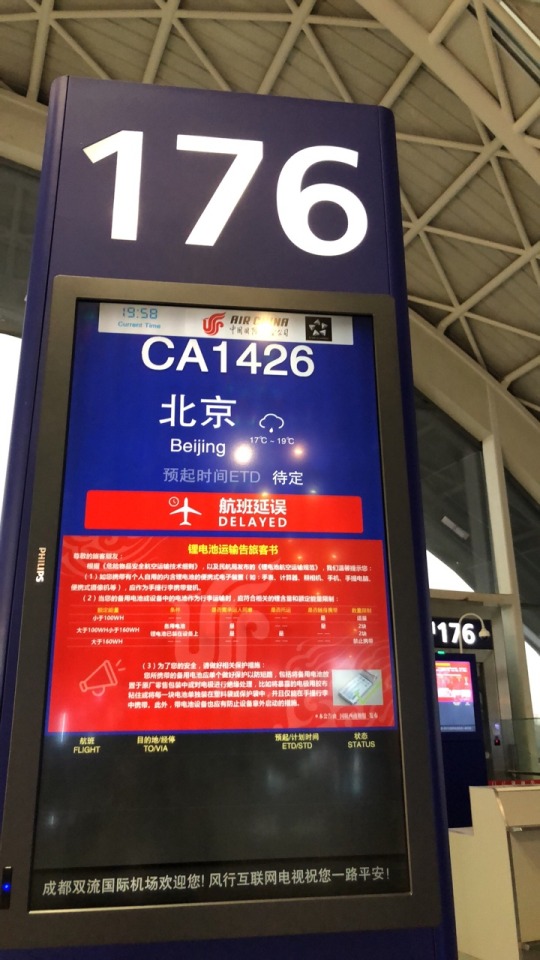
It all started with the flight delay.
After announcing the one-hour delay, they later changed it to "indefinite delay" due to bad weather in a nearby airport. Great. Indefinite delay. Not even the people in the receptionist in front of the airplane entrance had an estimate when we were gonna board.
Just "indefinite".
Luckily (well, no), we boarded the plane half an hour past midnight for a three-hour flight to Beijing. We were estimated to arrive around 4 AM. So, that 7 AM trip to the Great Wall needed to be changed, I suppose. To make it more interesting: after we landed in PEK at 4 in the morning, we were greeted by this beautiful marquee:
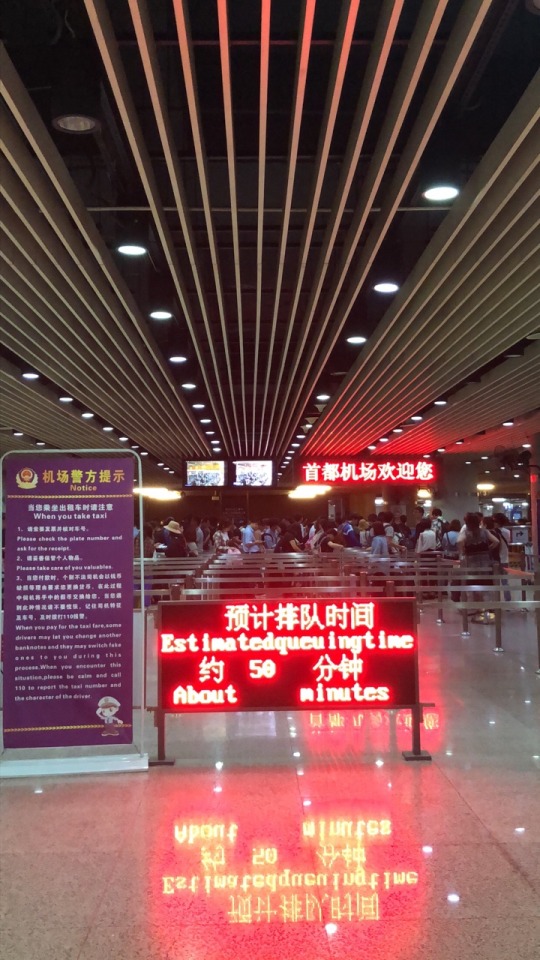
A 50-minute wait for a taxi at 4 in the morning. This was unbelievable. We only had one day to spend in Beijing and Murphy seemed to be keeping himself busy with us.
Sunday, June 10, 2018: We did not arrive to our hotel until 5:30 AM; we quickly agreed to hike up the Great Wall around noon instead. It might be a little sunny and crowded, but at least we would get enough rest. We cut the times for the Summer Palace, Temple of Heaven, Tiananmen Square, and the Forbidden City in half to accommodate with our extra hours of sleep.
Once again. Murphy was very busy that day and had plans on his own for us.
That morning, we talked to the receptionist regarding the best ways to travel to the Great Wall and she said that taxis can't access the walls and public transportation will take about two hours each way.
We did not have the time to have four hours just for transportation. What about a private driver? 900 yuan. Nope. Too expensive. Group tours? Last one that picked tourists up in front of our hotel left at 7 AM. Great. Now what?
We planned to take a taxi from the hotel to Deshengmen Station, which would take us directly to the most popular tourist spot of the Great Wall - Badaling.
We hailed the taxi, who told us that since it was a Sunday, the last bus from Deshengmen to Badaling was at 10 AM.
Okay, mister. Come up with a better lie.
So, he offered to drive us to a nearby station (I don't remember what it was called since he used a translation app during the entire ride - Wufanglian? Wufangyin? Wangfingyin?) where a group tour can drive us to Badaling, see some Ming tombs, and a Chinese garden with entrance tickets and lunch included for only 210 yuan.
Not bad since the driver said they would drop us back to the station, which was very close to our hotel anyway. The group tour would save us the time and the stress with finding transportation. We naively agreed to it.
Now, let us cut to the chase - this was a scam trip.
The bus was filled with middle-aged Chinese locals, a family with two children, and a young couple in their mid-20s, so I didn't feel very uncomfortable. We arrived in a suspiciously-empty side of Badaling, with no security checking for tickets, whatsoever after an hour of driving.
Anyways, we were on the Great Wall and that was all that mattered. I could skip out on the Ming tombs and the rest and just spend my time marveling the beauty of one of the wonders of the world.
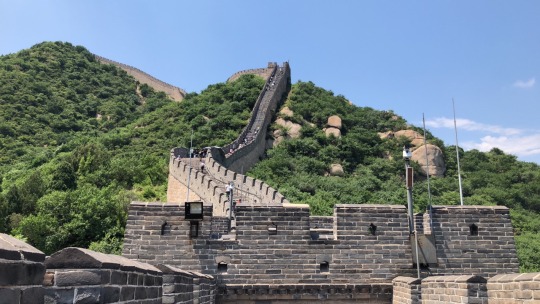
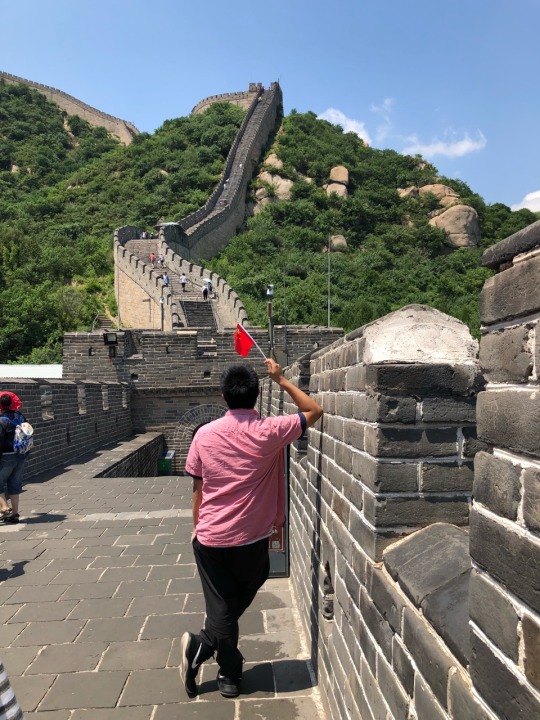
We stayed for one hour and went back to the bus. I estimated our time of arrival to be 3 PM so we had a few hours to fit the rest of the Beijing attractions.
I was wrong.
We were driven to a remote area where they had a terrible map of the Ming tombs on the wall.
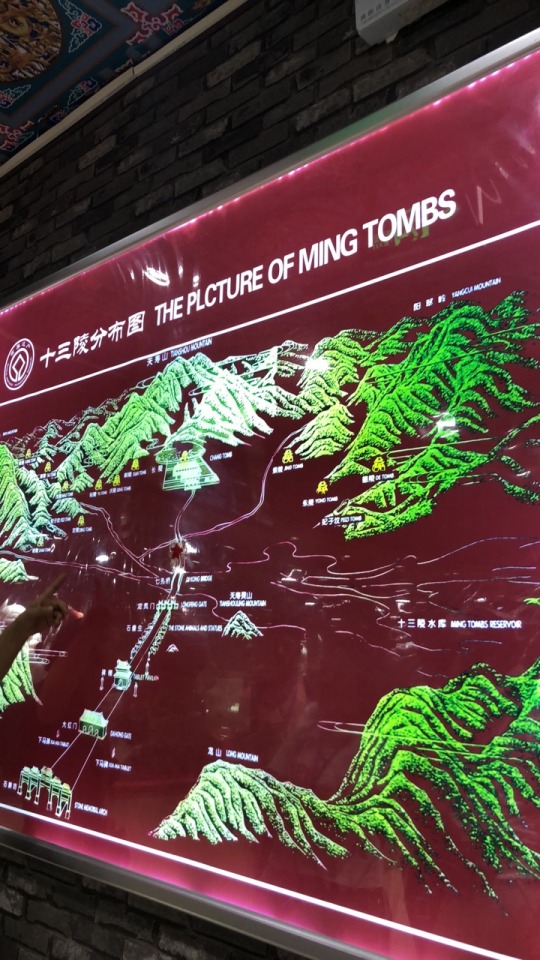
That was the Ming tombs tour. Just a map.
We were brought in to a huge room where they sold expensive jewelries and we had stayed there for an entire hour before getting lunch of just appetizers, such as cucumbers. That was it.
That was then when I knew this was the type of tourist scams I've read about online.
We stopped at another spot nearby where they sold Chinese chips and we were there for another good hour.
Another stop was with a garden where the tour guide had us walk around to talk about different rooms in a temple, and another map of where some antique Buddha statues were located around China - all in Chinese. Once again, we were there for another hour where they tried to sell jewelries to us.
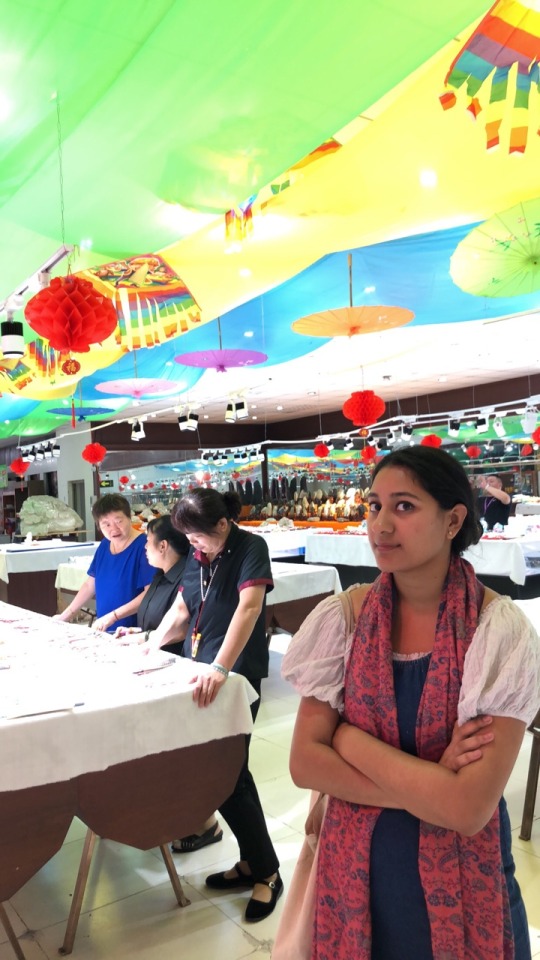
At this point, Simi and I were just upset and ready to pay a ridiculous amount of taxi fare to go back to our hotel since we were really far away from the city.
We were dropped off in front of the Olympic Stadium - I hated everyone part of that scam. They told us they were dropping us back to where we departed, now we had to figure out where we were and how to get back home.
Time stamp: 8:44 PM. Our day was gone. We were robbed 8 hours of our day with that damn scam of a group tour. I was very upset. We took a taxi to the Silk Market, since our Nursing family were staying in a hotel close to the market so we planned on surprising them before they leave Beijing back to Los Angeles.
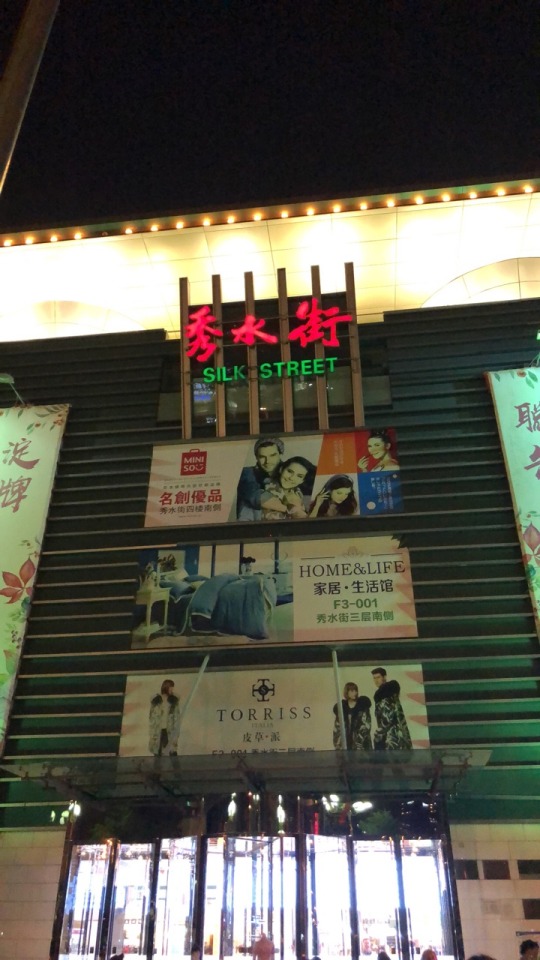
After exploring the Silk Market, which was surprisingly a very fancy mall of six floors where you get to practice your haggling skills, we walked to the hotel where our Nursing family was staying.
We stayed for an hour until we had access to Wi-Fi and saw on Snapchat that they departed Beijing at 11 in the morning.
Bummer. All our plans went down the drain.
We arrived back to our hotel close to midnight and agreed to visit Tiananmen Square and the Forbidden City early morning before our 1 PM flight to Hong Kong. Our hotel was situated just a 10-minute walk to the Forbidden City, so we spent the first part of our morning exploring the Tiananmen Square and the Forbidden City.
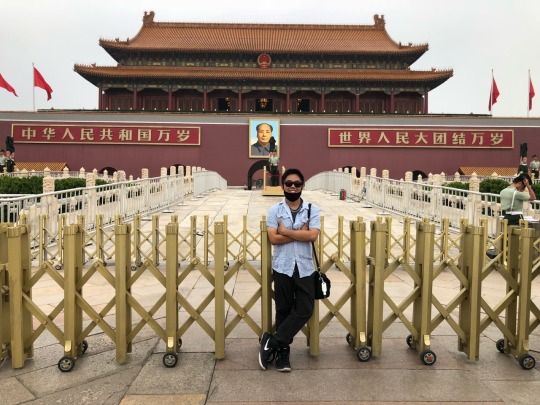
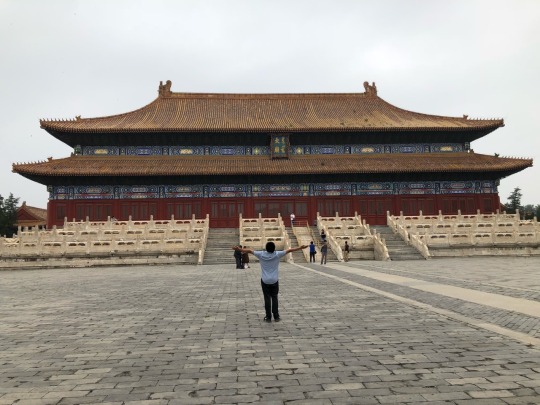
So, what did I think about my experience in China? Let's go back to the 10 fears mentioned in my Macau and Guangzhou blog.
China is filled with scammers and you have to constantly be wary of your surroundings - I only had this experience in Beijing, so I can't generalized the entire country based on that one incident, but yes. Scammers are ubiquitous in China and you need to be aware and educate yourself on the different schemes they use prior to visiting the country to avoid being placed in that situation.
Language barrier is the most terrifying thing - nobody will be able to help you since English is not widely taught; and apparently people are too impatient to even bother with a translator - Yes, language barrier is the biggest problem you'll have on a day-to-day basis but a lot of apps are available to help you navigate through China. I used Translate Offline and Pleco and got through just fine. Although, the Chinese have this great app that translate spoken Chinese into really well-written academic English sentences and I was very impressed. I still wonder what app that was.
The Great Firewall. Enough said - Okay, no. I made myself believe that all these apps would not open in China, but that's wrong. They're just very slow. If you use your data, you have access to all the Western apps, but if you use the Wi-Fi, then you wouldn't be able to even use them with how slow they are; but I used ExpressVPN during my entire trip in China.
China has a history of tracking its citizens, and visitors need to buy things that could prevent identity theft - I never really had an experience with this but I was told that WeChat is used by the government to track its people - and WeChat is everywhere. China is almost cashless because of WeChat - it's crazy. You can't survive the country if you don't have this app installed on your phone. This is a link to Mamahuhu’s video on how important WeChat is to the daily lives of the Chinese population if you want to find out more about it: China is Beyond Cashless As a review, WeChat and a VPN are the two most important apps you need installed prior to visiting the country.
Pollution. The internet needed me to buy a thick face mask to protect my respiratory system - Yup. The air was mean to my throat which gave me dry cough throughout my stay in China. You can see me wearing a black face mask in most of my pictures in the country. Even a few weeks after leaving Beijing, my throat is still somewhat irritated. It was so much worse in Beijing since you could not even see the buildings with how bad the pollution was. I will attach a picture towards the end of the blog.
The hot and humid weather is unbearable. You won't be able to do a lot with how much energy you're wasting by just sweating - Beijing had one of the most beautiful weathers I had ever experienced. It was cloudy with a nice cool breeze. We hiked up the Great Wall and did not even break a sweat.
Wild dogs carrying rabies everywhere, children pooping in street corners, squat toilets, and basically the complete opposite of the magnificent America. Apparently the whole country is rabid and unsanitary - No. This is just no. China is very civilized most of the time. The only time they aren't is in line where everybody feels the need to overtake. They even have quotes in the men’s urinals saying that stepping closer to the urinal is a step closer to a civilized China. Like, how communal is that? Haha. Other than that, Americans are actually meaner than the Chinese - at least in my experience in Los Angeles.
The food and water are very dirty. They apparently boil sewage water for consumption and the oil they use for street foods are months old. I was suggested to bring different medications for diarrhea, constipation, acid reflux, and all kinds of drugs for future stomach problems - I never had the chance to take any of the medications, thankfully; but for future reference, there are pharmacies in China and you are more than capable on buying Pepto Bismol when you need it. Bringing the whole pharmacy in your luggage is a little too much. I was scared for this to happen, so I only ate in actual restaurants and avoided suspicious places and streetfoods.
The people are mean and unforgiving. They will yell, hit, and shove as an instinct - Only in line!!! Beijingers are the worst during rush hour, and I've used the New York subways!
Overall, China is going to be a scary place for a first-time solo traveler - It is a very intimidating place, especially for someone whose Chinese knowledge is limited to ni hao and xiexie. But, embrace the independence if China is the first country you're traveling to as a first-time solo traveler. It has so much to offer, such as history, culture, food, and night life. I could not have asked for any other country to dive into as a solo traveler other than this one. The country matures you faster and you become more aware of which travel habits you need to change that only worked when traveling with other people and family.
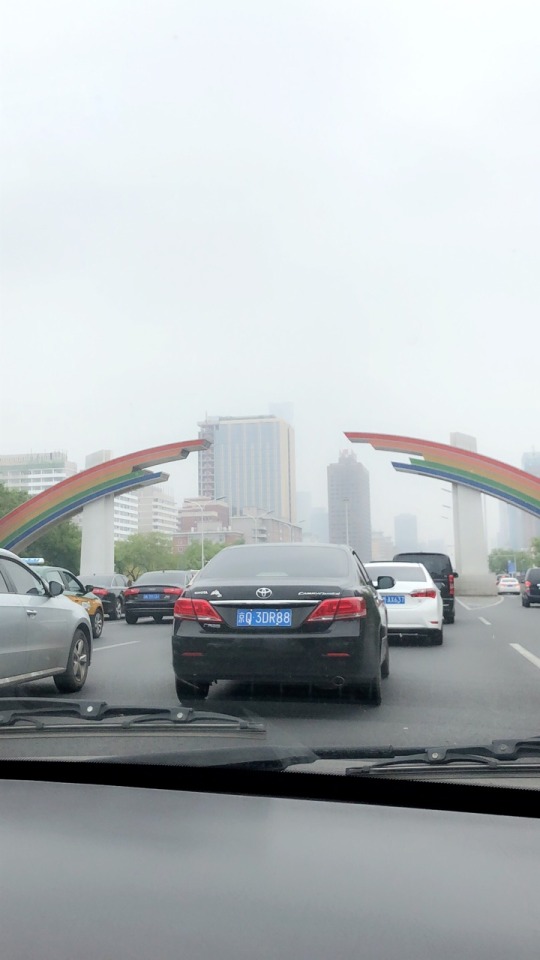
My phone is acting weird like it's not typing the word I want it to type and the cursor jumps everywhere. It rained today in Osaka, so I guess it got wet? Or maybe the screen is just oily from my fingers?
Anyways, I don't plan on writing a blog on my layover in Hong Kong or Seoul before heading to Tokyo since they were very uneventful.
Although, I stayed in HKG for 31 hours, which was definitely a first.
Just a heads-up, I expect my Tokyo blog to be very lengthy so I plan to divide it into four different blogs, so keep an eye out for that one (or those four, I guess). Until then!
谢谢, Chris 「克里斯」
0 notes
Text
Osnos, Evan - Age of Ambition: Chasing Fortune, Truth, and Faith in the New China
page 4 | location 54-58 | Added on Thursday, 14 May 2015 15:50:31
Above all, it is a time of plenty—the crest of a transformation one hundred times the scale, and ten times the speed, of the first Industrial Revolution, which created modern Britain. The Chinese people no longer want for food—the average citizen eats six times as much meat as in 1976—but this is a ravenous era of a different kind, a period when people have awoken with a hunger for new sensations, ideas, and respect. China is the world’s largest consumer of energy, movies, beer, and platinum; it is building more high-speed railroads and airports than the rest of the world combined.
page 6 | location 85-88 | Added on Thursday, 14 May 2015 15:54:42
China today is riven by contradictions. It is the world’s largest buyer of Louis Vuitton, second only to the United States in its purchases of Rolls-Royces and Lamborghinis, yet ruled by a Marxist-Leninist party that seeks to ban the word luxury from billboards. The difference in life expectancy and income between China’s wealthiest cities and its poorest provinces is the difference between New York and Ghana.
page 8 | location 115-117 | Added on Thursday, 14 May 2015 15:58:25
The longer I lived in China, the more I sensed that the Chinese people have outpaced the political system that nurtured their rise. The Party has unleashed the greatest expansion of human potential in world history—and spawned, perhaps, the greatest threat to its own survival.
page 39 | location 591-594 | Added on Friday, 15 May 2015 17:03:15
“To survive in China you must reveal nothing to others. Or it could be used against you … That’s why I’ve come to think the deepest part of the self is best left unclear. Like mist and clouds in a Chinese landscape painting, hide the private part behind your social persona. Let your public self be like rice in a dinner: bland and inconspicuous, taking on the flavors of its surroundings while giving off no flavor of its own.”
page 69 | location 1050-1052 | Added on Saturday, 16 May 2015 17:49:28
The size of China’s population made college admissions so brutally competitive that people compared it to “ten thousand horses crossing a river on a single log.” To create more opportunities, the government doubled the number of colleges and universities, in just ten years, to 2,409. Even so, only one in every four aspiring college students was able to earn a place.
page 98 | location 1496-1498 | Added on Tuesday, 19 May 2015 16:58:22
By 2007, when Siu Yun-Ping hit his streak in Macau, the China scholar Minxin Pei noted that nearly half of all Chinese provinces had sent their chief of transportation to jail. Pei calculated that corruption of one kind or another was costing China 3 percent of its gross domestic product—more than the national budget for education.
page 104 | location 1595-1596 | Added on Tuesday, 19 May 2015 17:11:09
“Chinese have never looked at foreigners as human beings,” Lu Xun wrote. “We either look up to them as gods or down on them as wild animals.”
page 106 | location 1617-1619 | Added on Tuesday, 19 May 2015 17:13:31
When the Chinese travel industry surveyed the public on its dream destinations, no place scored higher than Europe. Asked what they liked about it, the Chinese put “culture” at the top of the list. (On the negative side, respondents complained of “arrogance” and “poor-quality Chinese food.”)
page 120 | location 1837-1839 | Added on Tuesday, 19 May 2015 17:37:45
“Analysts overseas can never understand why the Chinese economy has grown so fast,” he said. “Yes, it’s a one-party state, but the administrators are selected from among the elites, and elites picked from one-point-three billion people might as well be called super-elites.”
page 157 | location 2393-2395 | Added on Saturday, 23 May 2015 17:58:20
“Chinese people have begun to think, ‘One part is the good life, another part is democracy,’” Liu went on. “If democracy can really give you the good life, that’s good. But without democracy, if we can still have the good life, why should we choose democracy?”
page 186 | location 2849-2851 | Added on Sunday, 24 May 2015 18:10:53
“I don’t believe anyone who truly loves literature can also love Mao Zedong,” he told me. “These two things are incompatible. Even putting aside his political performance, or how many bad things he did, or how many people starved to death because of him, or how many people he killed, there is one thing for sure: Mao Zedong was the enemy of writers.”
page 210 | location 3211-3213 | Added on Monday, 25 May 2015 16:55:20
His contacts overseas and his embrace of the Internet merged two of the Party’s most neuralgic issues: the threat of a foreign-backed “color revolution” and the organizing potential of the Web. The previous year, President Hu Jintao told the Politburo, “Whether we can cope with the Internet” will determine “the stability of the state.”
page 221 | location 3387-3392 | Added on Monday, 25 May 2015 17:13:40
Two days after Liu won the prize, his wife, Liu Xia, visited him at Jinzhou Prison in the province of Liaoning. “This is for the lost souls of June Fourth,” he told her. Returning to Beijing, she was placed under house arrest. The government barred her, and anyone else, from going to Oslo to pick up the award; the only previous time this had happened was in 1935, when Hitler prevented relatives from going on behalf of Carl von Ossietzky, the German writer and pacifist, who was in a guarded hospital bed after having been in a concentration camp. Liu Xia’s telephone and Internet connections were severed, and she was barred from contact with anyone but her mother—the beginning of a campaign of isolation that would last for years.
page 222 | location 3399-3404 | Added on Monday, 25 May 2015 17:15:37
Decades ago, the black screen had been a fair reflection of China’s blinkered view of the world, its backwardness and seclusion. But now the instinct to shield the public from unflattering facts was absurdly at odds with the openness and sophistication in other parts of Chinese life, and it seemed to cheapen what ordinary Chinese people had worked so hard to achieve. China was not Hitler’s Germany, but Chinese leaders were willing to let themselves be lumped beside the Nazis in the history of the Nobel Prize. Either the strongest forces in the Chinese government were not wise enough to realize the cost, or the wisest forces were not strong enough to persuade the others.
page 245 | location 3748-3753 | Added on Tuesday, 26 May 2015 18:04:36
The truth was that I struggled with the question of how much to write about Ai Weiwei—or, for that matter, the blind lawyer Chen Guangcheng or the Nobel laureate Liu Xiaobo. How much did their ordeals really tell us about China? If the average news consumer in the West read (or watched or heard) no more than one China story a week, should it be about people with dramatic lives or typical lives? The hardest part about writing from China was not navigating the authoritarian bureaucracy or the occasional stint in a police station. It was the problem of proportions: How much of the drama was light and how much was dark? How much was about opportunity and how much was about repression? From far away it was difficult for outsiders to judge, but I found that up close it wasn’t much easier, because it depended on where you were looking.
page 264 | location 4047-4049 | Added on Wednesday, 27 May 2015 17:44:23
In 2011 the central bank posted to the Web an internal report estimating that, since 1990, eighteen thousand corrupt officials had fled the country, having stolen $120 billion—a sum large enough to buy Disney or Amazon. (The report was promptly removed.)
page 293 | location 4484-4486 | Added on Thursday, 28 May 2015 18:05:26
The longer I lived in China, the more it seemed that people had come to see the economic boom as a train with a limited number of seats. For those who found a seat—because they arrived early, they had the right family, they paid the right bribe—progress was beyond their imagination. Everyone else could run as far and fast as their legs would carry them, but they would only be able to watch the caboose shrink into the distance.
page 335 | location 5133-5134 | Added on Friday, 5 June 2015 16:32:37
“Of the various countries I’ve visited,” Sandel told me the next day, “the free-market assumptions and convictions are more present in China among young people than anywhere, with the possible exception of the United States.”
page 366 | location 5607-5608 | Added on Sunday, 7 June 2015 16:57:40
It was impossible to know what “most Chinese” believed because the state media and the political system were designed not to amplify public opinion but to impose a shape upon it.
page 397 | location 6079-6085 | Added on Monday, 8 June 2015 17:38:54
Chinese leaders were facing a choice: to continue growing, they could adopt a more democratic form of government, as South Korea did in the 1980s, or they could recommit themselves to authoritarianism. Historically, the latter approach was risky. Over the long term, authoritarian states do not grow as reliably as democracies; they are fragile, and they tend to thrive only in the hands of visionary individual leaders. “For every Lee Kuan Yew, of Singapore, there are many like Mobutu Sese Seko, of the Congo,” according to the Harvard economist Dani Rodrik. In the short term, the Party could succeed at silencing its critics, but in the long term, that was less clear, especially if segments within the Party recalculated their own risks and rewards for loyalty and decided that they had more to gain by siding with the people.
page 398 | location 6092-6096 | Added on Monday, 8 June 2015 17:40:55
In many countries, a more educated and entrepreneurial middle class has demanded greater control over its affairs. China had already passed the threshold into what political scientists call the “zone of democratic transition”—when a country’s per capita income exceeds four thousand dollars, and the correlation with regime change rises sharply. By 2013, China was at a level of eight thousand five hundred dollars. The China scholar Minxin Pei examined the twenty-five autocracies with higher levels of income and a resistance to democratization. He found that twenty-one of them were oil states. China was not.
0 notes